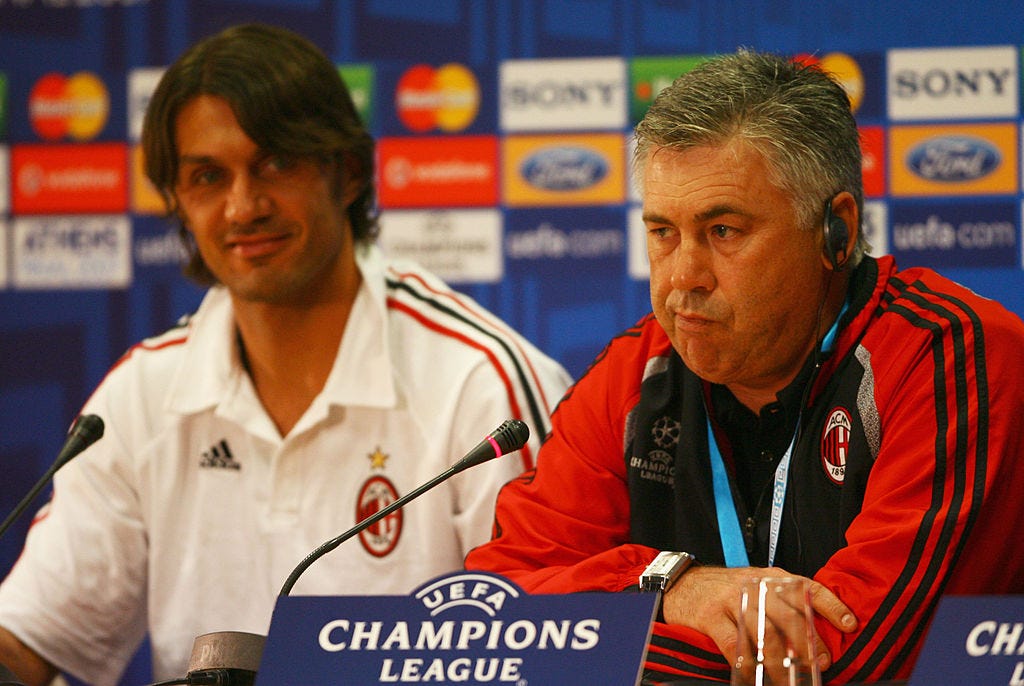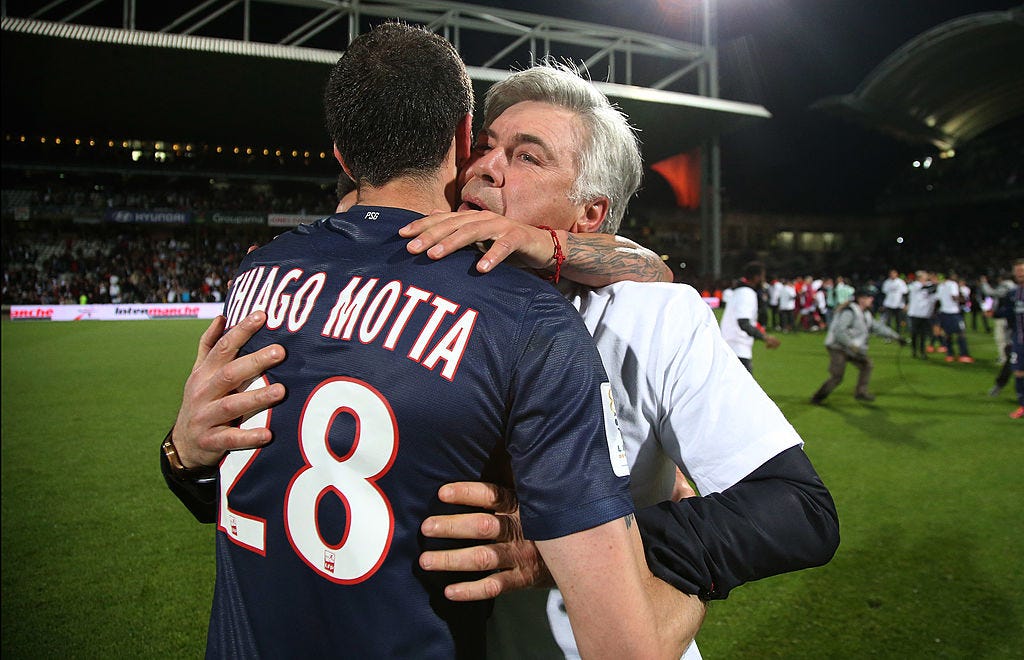Kindness Can Still Win
Carlo Ancelotti is more than just a manager. He's football with feeling.
There are two ways to move a horse across a fence. Some people would whip it and yell, forceful authority. Carlo Ancelotti, in his own words, would simply stand on the other side, arm outstretched, and offer a carrot.
It has occurred to me this week that there is perhaps no imagery better suited to describe Ancelotti – far and away the nicest guy in world football – than a man, gentle and unassuming, standing across a fence from a horse and kindly holding out a carrot, expecting but not demanding and in the sincerest form possible, likely with a raised eyebrow and a soft smile.
That is Ancelotti in a nutshell actually. There has been a lot of talk about the great man lately, particularly after a difficult few weeks for the Italian at Real Madrid. There was that hard-fought and frustrating loss to Valencia that came before their crash-and-burn exit to Arsenal in the Champions League. A string of scrappy, unconvincing 1-0 wins in La Liga then led into a Copa del Rey final for the ages against Barcelona – a final Madrid lost, won, and lost again in spectacular fashion. And there is now: rumors of increasing certainty about his departure from Madrid at the end of the season, his likely retirement from club football management as a whole, and his potential new role as manager of the Brazil national team.
But this is not a eulogy to Ancelotti’s great managerial career. There is a sense of finality in his imminent departure from Europe, sure, but this is less about Ancelotti the manager and more about Carletto the person. The accolades of course are there for all to see, and don’t really bear repeating, but it’s fun so, let’s take a little walk: he is the only manager in the history of football to have won league titles in all of Europe’s big five leagues, the only one to have won the Champions League five times too. This is a career that reads like football’s most ambitious fantasy save – unmatched, unrepeatable, but somehow not unbelievable.
But to me, what stands out most about Ancelotti is not his trophy haul, or his tactical nuances, or even his footballing philosophy. It’s his heart. His ability, willingness and determination to always see his players as people first and athletes second. His desire to always take the simple route, to live life and play football uncomplicated. His understanding that as much as this sport means everything to everyone, it sometimes also means nothing.
Arrigo Sacchi, Ancelotti’s mentor and former manager both at AC Milan and the Italy national team once told him that football is “the most important of the least important things in life.” Ancelotti took that to heart, and without realising it, purely by watching the great Italian, I think I did too.
Watching Ancelotti taught me that you could care deeply about this sport but never lose yourself to it. That you could love football but never forget that it was a game played, at the end of the day, by people. People like you and me. People with stories, with lives, with challenges and privileges, and above all, with hearts. And that people always mattered more than results and trophies.
That simple philosophy has quietly shaped the way I see the game and, naturally, the way I write about it. Most of all, I think, it’s also shaped the way I look at the world. Ancelotti reminds us that every athlete is a person with a life off the pitch, a story that doesn’t fit into a highlight reel. He’s built his success not on domination or dogma, but on empathy. In a sport increasingly obsessed with systems, spreadsheets, and tactical frameworks, this feels rare and almost antiquated.
I reflect this within myself a lot too.
There’s a kind of writing I struggle with after a point, the kind that looks at footballers as stats in a database or numbers in a spreadsheet. I’m no good when it comes to numbers. I’ve never been, to be honest. I’m getting better now, but I will forever maintain that there’s a feeling, a texture to this game you miss completely when you fail to see these players as people. Maybe that’s why Ancelotti matters so much to me; because he is a reminder that kindness, patience, and raw humanity aren’t wasteful. They’re an integral part of this process, of this game, and of life.
Watching Ancelotti taught me that you could care deeply about this sport but never lose yourself to it. That you could love football but never forget that it was a game played, at the end of the day, by people.
There are countless stories to support this – of him taking an extra moment with a player, welcoming a new signing with warmth, or simply being a decent human being in a world that often forgets to be. But perhaps the best one comes from his days at PSG.
Thiago Motta once told the story of a night when he and a group of PSG players went to an upscale restaurant in Paris after training. Ezequiel Lavezzi, ever the daredevil, decided to invite then-manager Ancelotti to join them. Motta and the others assumed he wouldn’t come, but after fifteen minutes, there he was. Unexpected for nearly anyone else but deeply expected for Ancelotti.
He joined them for a drink, told wonderful stories about his days at AC Milan, listened to theirs, and laughed. And when the moment was right, he stood up and said, according to Motta: “It’s time. I have to go back. You do what you want here, but on Sunday, I’m counting on you to have a great match.”
“We looked at each other,” Motta said, “And asked: how can we not want to play for him? How much should we win by? 5-0, at least?” That Sunday, the love poured out, of course, and PSG played brilliantly, much as Ancelotti had hoped they would.
That night in Paris, this story, is the quintessential Ancelotti thing. Here the picture painted is of a man who didn’t demand anything but earned everything. A manager who has always dared to care, to empower, to endear. This has been his superpower from the very beginning, from his earliest days on the scene as Sacchi’s right hand man at Milan all the way to the present, his final days amongst the European elite at Real Madrid. This is the man the players love and so to the fans.
And maybe that’s his real legacy. Not just the medals or the trophies or the records that no one else has touched, but the inquisitively-raised eyebrow and the always-open heart. Ancelotti is a reminder that even in the toughest of situations, the worst of circumstances, kindness can still win.
Just hold out the carrot and see for yourself.
Some other recent bits I’d love you to check out:










Do you think his antiques towards referees at the end of his career tarnished this legacy a little bit?